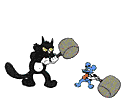billh wrote:Joseph E. Smith wrote:Old tunes used to be new tunes. Avoiding new tunes, IMHO, could lead to a stagnant art. ...
I agree that art stagnates when no one is creating it, even if many are conserving it. But IMO playing the "old" repertoire is itself a creative act.
...
Every performance is an interpretation, you don't have to go looking for new thrills to avoid fossilization. Change will happen naturally, even if you don't seek it. I seems to me that such an "evolutionary" pace is the best for a traditional art.
You both make valid points (above, and earlier, Joseph & Bill), and no-one would argue that the pipes have a large established repertoire that is pretty much inseparable from the instrument.
The original question knocking around in my head though was this: what should a professional musician working in the ITM idiom be doing over and above performing? I don't see composition as being in any way in contradiction with conserving the idiom. After all, during the last period of history in which it was possible to play ITM professionally, the late seventeenth century, with the blind harpers, composition of new tunes in honour of the host was a big part of the job.
I agree that something new can come out of established material, through the artistic interpretation of the performer. And it is true that new som material is being composed in the ITM idiom, by both amateurs and pros.
But I would argue that it should be the role of professionals to "take it up a notch", to be not just
quantitively (i.e., faster, louder, bigger repertoire, etc), but
qualitatively different from amateurs, in the sense of doing something that amateurs don't or can't do. In the words of the character on Saturday Night Live: Take it to the H-N-L (whole-nother-level)

It seems like we've entered a time when a substantial number of people can make a living from ITM, but for whatever reason (conservative audiences, conservative ethos in the ITM community) shy away from composing. To take the evolutionary metaphor, the "conservative gene" served the music well in getting through the last few hundred years. But now that that bottleneck has been successfully negotiated, it seems to me it is once again possible to let the hair down, branch out, try new things. That doesn't mean old things have to be thrown away, just that the community may now be big enough to admit more biodiversity.
I'm not even talking about radical changes, say like Moving Hearts were in the 80's, or the Afro Celts in the 90's. Think about the Cape Breton community, in which thousands of tunes (or at least it seems that way!) were composed by people who are within living memory. They don't break the traditional mould, they're still strathspeys, reels, etc. But they're
newly composed strathspeys and reels.
Anyway, this all started because I thought it was great that Diarmaid Moynihan was writing new tunes that fit very well into the traditional idiom. From what I hear/read on this BBS, Eoin Dillon is doing the same. I, for one, will be checking it out.
Thanks for the interesting discussion.
-Frank
